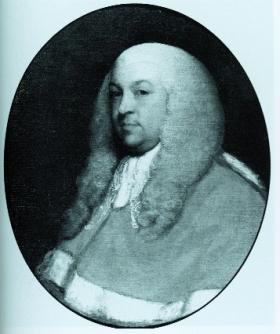From the files of the DIB…Copper-faced Jack
Published in 18th–19th - Century History, Issue 6 (Nov/Dec 2006), News, Volume 14 SCOTT, John (1739–98), first earl of Clonmel, lawyer and MP, was born 8 June 1739, third son of Thomas Scott, Church of Ireland vicar of Urlings, Co. Kilkenny, and his wife Rachel (née Prim) of Johnswell, Co. Kilkenny. During his early education at Clonmel, Co. Tipperary, Scott protected Hugh Carleton, later Lord Viscount Carleton, from bullies. In gratitude, Carleton’s father financed Scott’s education, sending him to Trinity College, Dublin (1756), and the Middle Temple (1758). Scott never forgot this early kindness, and years later, when Carleton’s son became a bankrupt, he settled £300 a year on him for life. At Trinity, Scott was influenced by the Patriot Charles Lucas, and championed the popular cause in college elections. He was called to the Irish bar in 1765, and his legal acumen soon attracted the attention of the lord chancellor, Lord Lifford, who recommended him for office. In 1769 he became MP for Mullingar, and was appointed KC in 1770. He single-handedly kept the attacks of Henry Flood and the Patriot party at bay and was appointed solicitor-general (1774) and attorney-general (1777). He accepted the latter position with the words ‘My lord, you have spoiled a good patriot’.
SCOTT, John (1739–98), first earl of Clonmel, lawyer and MP, was born 8 June 1739, third son of Thomas Scott, Church of Ireland vicar of Urlings, Co. Kilkenny, and his wife Rachel (née Prim) of Johnswell, Co. Kilkenny. During his early education at Clonmel, Co. Tipperary, Scott protected Hugh Carleton, later Lord Viscount Carleton, from bullies. In gratitude, Carleton’s father financed Scott’s education, sending him to Trinity College, Dublin (1756), and the Middle Temple (1758). Scott never forgot this early kindness, and years later, when Carleton’s son became a bankrupt, he settled £300 a year on him for life. At Trinity, Scott was influenced by the Patriot Charles Lucas, and championed the popular cause in college elections. He was called to the Irish bar in 1765, and his legal acumen soon attracted the attention of the lord chancellor, Lord Lifford, who recommended him for office. In 1769 he became MP for Mullingar, and was appointed KC in 1770. He single-handedly kept the attacks of Henry Flood and the Patriot party at bay and was appointed solicitor-general (1774) and attorney-general (1777). He accepted the latter position with the words ‘My lord, you have spoiled a good patriot’.
While serving in these offices Scott’s opposition to popular causes earned him public vilification, and in 1779 his home in Harcourt Street was attacked and every pane of glass broken. His general demeanour was not calculated to endear him to the public. He was a poor speaker: it was said that when he failed to convince, he diverted; if he could not divert, he used sarcasm and ridicule; and if he could not bully, he fought. His aggressiveness in argument, and his bronzed skin tone, earned him the sobriquet ‘Copper-faced Jack’. He is particularly remembered for his attack on Flood in 1781, in which he portrayed him as a political and social outcast who caused trouble only out of vanity and frustrated ambition.
With the collapse of Lord North’s government in March 1782, Scott was dismissed from office, but was reinstated in 1783 as prime serjeant. The appointment of such an anti-Whig and anti-Patriot figure pained English Whigs and Irish Patriots and indicated that Patriot politicians could no longer keep the Irish government afloat alone. In May 1784 he was made chief justice of the king’s bench for life, and ennobled as Baron Earlsfort of Lisson Earl, Co. Tipperary. He was later created viscount (1789) and earl of Clonmel (1793).
Although an outspoken opponent of parliamentary reform, in 1784 he refused to help the government suppress the reform congress that had precipitated the debate, as he felt that suppression would only publicise the congress’s cause. His response to the radical politics of the 1790s was not entirely reactionary either. His first wife had Catholic relations, and from 1782 he declared his support for Catholic relief. During the 1790s he urged the government to prevent bloodshed by arresting the United Irish leaders before rebellion broke out.
In the event, Scott died just before rebellion took place. It is said that the root of his demise originated in 1789, when John Magee, proprietor of the Dublin Evening Post, was accused of libelling Scott’s friend Francis Higgins. In revenge, Scott attempted to ruin Magee by fining him £7,800. Unable to pay, Magee was sent to prison. In March 1790 the case was brought before parliament, which found in Magee’s favour, and an act was passed to prevent such large fines in the future. Scott became a figure of public ridicule, and Magee rented a field opposite his demesne and advertised each month that he was going to hold a pig hunt. Hundreds and thousands of people assembled and ruined Scott’s property. The distress of this ordeal appears to have broken his health and he died on 23 May 1798 at his home in Harcourt Street, Dublin. By this time his estates, which he had built up through investment, office and prudential marriages, returned £20,000 a year.
Rosemary Richey is a former editorial assistant with the Dictionary of Irish Biography.
















